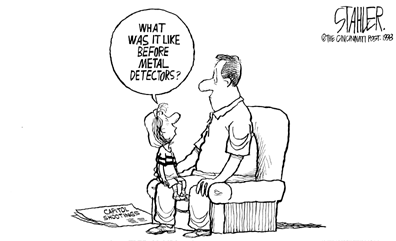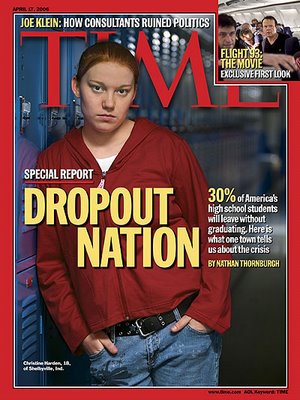(I found the following article over the break and thought it might be of interest before the next math meeting.)
Provided in partnership with: The Council for Exceptional Children
From: The ERIC Clearinghouse on Disabilities and Gifted Education ERIC EC Digest #E594Author: Dana T. JohnsonApril 2000
Mathematically gifted students have needs that differ in nature from those of other students. They require some differentiated instruction, defined by Tomlinson (1995) as "consistently using a variety of instructional approaches to modify content, process, and/or products in response to learning readiness and interest of academically diverse students." Yet recent studies have found few instructional or curricular modifications in regular elementary classrooms (Archambault et al., 1993; Westberg, Archambault, Dobyns & Salvin, 1993). In grades 9-12, students may be able to select honors, advanced, and AP courses; however, even in these more homogeneously grouped classes there is a range of differences that need to be acknowledged.
Why should we do anything different for mathematically gifted students?
Gifted students differ from their classmates in three key areas that are especially important in mathematics.
Mathematically gifted students differ from the general group of students studying math in the following abilities: spontaneous formation of problems, flexibility in handling data, mental agility of fluency of ideas, data organization ability, originality of interpretation, ability to transfer ideas, and ability to generalize (Greenes, 1981). No list of characteristics of the mathematically gifted includes "computational proficiency," and yet at levels prior to Algebra I, this is commonly used as the criterion that determines who gets to move on to more interesting material.
Furthermore, there is a myth that gifted students don't need special attention since it is easy for them to learn what they need to know. On the contrary, their needs dictate curriculum that is deeper, broader, and faster than what is delivered to other students.
Mathematics can be the gatekeeper for many areas of advanced study. In particular, few gifted girls recognize that most college majors leading to high level careers and professions require four years of high school math and science (Kerr, 1997). Students may drop out of math courses or turn toward other fields of interest if they experience too much repetition, not enough depth, or boredom due to slow pacing.
An Agenda for Action: Recommendations for School Mathematics of the 1980s (NCTM, 1989, p. 18) says, "the student most neglected, in terms of realizing full potential, is the gifted student of mathematics. Outstanding mathematical ability is a precious societal resource, sorely needed to maintain leadership in a technological world." By 1995, when the NCTM created a Task Force on the Mathematically Promising, not much had changed (Sheffield et al., 1995).
What do the Curriculum Standards of the National Council of Teachers of Mathematics (NCTM) say we should do about mathematically gifted students?
The NCTM Standards do not mention gifted students explicitly but recognize that students are not all the same. For all students, the Standards place a greater emphasis on areas that traditionally have been emphasized for the gifted. All students are now expected to complete a core curriculum that has shifted its emphasis away from computation and routine problem practice toward reasoning, real-world problem solving, communication, and connections. "The Standards propose that all students be guaranteed equal access to the same curricular topics; it does not suggest that all students should explore the content to the same depth or at the same level of formalism" (NCTM, 1989, p. 131). At the high school level, additional topics are suggested for "college-intending" students. The Report of the Task Force on the Mathematically Promising recognizes that there are special issues relating to the education of the mathematically promising student (Sheffield et al., 1995) and has made recommendations that include the development of new curricular standards, programs, and materials that encourage and challenge the mathematically promising.
What should be done to differentiate curriculum, instruction and assessment for the mathematically gifted in the regular classroom?
Historically there has been debate about the role of acceleration versus enrichment as the differentiation mode for mathematics. Most experts recommend a combination. The following are suggestions for differentiating for the mathematically gifted by using (1) assessment, (2) curriculum materials, (2) instructional techniques, and (4) grouping models. These opportunities should be made broadly available to any student with interest in taking advantage of them.
Give pre-assessments so that students who already know the material do not have to repeat it but may be provided with instruction and activities that are meaningful. In the elementary grades, gifted learners still need to know their basic facts. If they do not, don't hold them back from other more complex tasks, but continue to work concurrently on the basics.
Create assessments that allow for differences in understanding, creativity, and accomplishment; give students a chance to show what they have learned. Ask students to explain their reasoning both orally and in writing.
Choose textbooks that provide more enriched opportunities. Unfortunately, curriculum in this country is mainly driven by textbooks, which are used about 80% of the time (Lockwood, 1992). Math textbooks often repeat topics from year to year in the grades prior to algebra. Since most textbooks are written for the general population, they are not always appropriate for the gifted. Several series that hold promise for gifted learners have been developed recently under grants from the National Science Foundation; they emphasize constructivist learning and include concepts beyond the basics.
Use multiple resources. No single text will adequately meet the needs of these learners.
Be flexible in your expectations about pacing for different students. While some may be mastering basic skills, others may work on more advanced problems.
Use inquiry-based, discovery learning approaches that emphasize open-ended problems with multiple solutions or multiple paths to solutions. Allow students to design their own ways to find the answers to complex questions. Gifted students may discover more than you thought was possible.
Use lots of higher-level questions in justification and discussion of problems. Ask "why" and "what if" questions.
Provide units, activities, or problems that extend beyond the normal curriculum. Offer challenging mathematical recreations such as puzzles and games.
Provide AP level courses in calculus, statistics, and computer science or encourage prepared students to take classes at local colleges if the supply of courses at the high school has been exhausted.
Differentiate assignments. It is not appropriate to give more problems of the same type to gifted students.
You might give students a choice of a regular assignment; a different, more challenging one; or a task that is tailored to interests.
Expect high level products (e.g., writing, proofs, projects, solutions to challenging problems).
Provide opportunities to participate in contests such as Mathematical Olympiads for the Elementary School (grades 4-6), Math Counts (grades 7-8), and the American Junior High School Mathematics Exam (grades 7-8) or the American High School Mathematics Exam (grades 9-12). Give feedback to students on their solutions. After the contests, use some of the problems as the basis for classroom discussions.
Provide access to male and female mentors who represent diverse linguistic and cultural groups. They may be within the school system, volunteers from the community, or experts who agree to respond to questions by e-mail. Bring speakers into the classroom to explain how math has opened doors in their professions and careers.
Provide some activities that can be done independently or in groups based on student choice. Be aware that if gifted students always work independently, they are gaining no more than they could do at home. They also need appropriate instruction, interaction with other gifted students, and regular feedback from the teacher.
Provide useful concrete experiences. Even though gifted learners may be capable of abstraction and may move from concrete to abstract more rapidly, they still benefit from the use of manipulatives and "hands-on" activities.
How can technology support the needs of the gifted?
Technology can provide a tool, an inspiration, or an independent learning environment for any student, but for the gifted it is often a means to reach the appropriate depth and breadth of curriculum and advanced product opportunities. Calculators can be used as an exploration tool to solve complex and interesting problems.
Computer programming is a higher level skill that enhances problem solving abilities and promotes careful reasoning and creativity. The use of a database, spreadsheet, graphic calculator, or scientific calculator can facilitate powerful data analysis. The World Wide Web is a vast and exciting source of problems, contests, enrichment, teacher resources, and information about mathematical ideas that are not addressed in textbooks. Technology is an area in which disadvantaged gifted students may be left out because of lack of access or confidence. It is essential that students who do not have access at home get the exposure at school so that they will not fall behind the experiences of other students.
What is the responsibility of schools and teachers in developing giftedness in mathematics?
Classroom teachers and school districts share the responsibility of addressing the needs of gifted students.
Teachers need training and support in recognizing and addressing the needs of the mathematically gifted.
Teachers who teach mathematics to gifted learners need a strong background in mathematics content. If the school has only a few students with special needs and does not have such a teacher, a mentor from outside the school should be located to work with individuals.
A coordinated curriculum plan needs to be in place so that the mathematical experiences for students are not duplicated or interrupted from one year to the next.
The school should have an organized support system that includes resource books, technology, and human resources.
Regular mathematics classrooms that offer sufficiently challenging and broad experiences for gifted students have the potential to enrich the learning community as a whole since other students will be interested in attempting, perhaps with help, some of the more challenging tasks. If math classes offer diversity in assignments, products, and pacing and monitor student needs, all students will be able to work at their own challenge level.
References
Archambault, F. X., Westberg, K. L., Brown, S. W., Hallmark, B. W., Zhang, W., & Emmons, C. L. (1993). Classroom practices used with gifted third and fourth grade students. Journal for the Education of the Gifted, 16, 103-119.
Greenes, C. (1981). Identifying the gifted student in mathematics. Arithmetic Teacher, 28, 14-18.
Lockwood, A. T. (1992). The de facto curriculum. Focus in Change, 6. Maker, J. (1982). Curriculum development for the gifted. Rockville, MD: Aspen Systems Corporation.
Kerr, B. A. (1997). Developing talents in girls and young women. In N. Colangelo & G. A. Davis (Eds.), Handbook of gifted education (2nd ed., pp. 483-497). Boston: Allyn & Bacon.
National Council of Teachers of Mathematics. (1989). Curriculum and evaluation standards for school mathematics. Reston, VA: Author. Sheffield, L. J., Bennett, J., Berriozábal, M, DeArmond, M., Wertheimer, R. (1995) Report of the task force on the mathematically promising. Reston, VA: National Council of Teachers of Mathematics.
Tomlinson, C. A. (1995). Deciding to Differentiate Instruction in Middle School: One school's journey. Gifted Child Quarterly, 39, 77-87.
Westberg, K. L., Archambault, F. X., Dobyns, S. M. & Salvin, T. J. (1993) The classroom practices observation study. Journal for the Education of the Gifted, 16, 120-146.
Dana Johnson is a mathematics instructor at the College of William and Mary and also teaches enrichment classes through the Center for Gifted Education at the College.
 What means for truly stopping the problem are going to put into place by the department of education? We shouldn’t be concerned if Johny has a gun in his bag but rather why Johny felt he needed to buy the gun. Are the “Savage Inequalities” that are being replicated in schools being addressed?
What means for truly stopping the problem are going to put into place by the department of education? We shouldn’t be concerned if Johny has a gun in his bag but rather why Johny felt he needed to buy the gun. Are the “Savage Inequalities” that are being replicated in schools being addressed?









